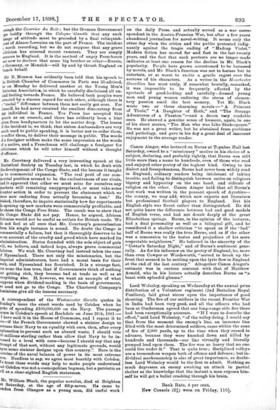Canon Ainger, who lectured on Burns at Toynbee Hall last
Saturday, owned to a " missionary " motive in his choice of a subject, declaring, and probably rightly, that Burns was still little more than a name to hundreds, even of those who read and enjoyed other poetry of the highest kind. Owing to his dialect and freespokenness, Burns had never been widely read in England; ordinary readers being intolerant of taking trouble, and failing to distinguish between satire on religious bigotry and hypocrisy on the one hand, and ridicule of religion on the other. Canon Ainger held that all Burns's best work was written in the peasant speech of Ayrshire— the county, we may add, which now exports not literature but professional football players to England. But his English style was fluent rather than distinguished. He did not quite know the difference between bad and good models of English verse, and had not drunk deeply of the great Elizabethan springs. Burns, in the opinion of the lecturer, had a dual personality as well as a bilingual gift, and he considered it a shallow criticism " to speak as if the ' bad' half of Burns was really the true Burns, and as if the other was a concession to the tastes and prejudices of his more respectable neighbours." He believed in the sincerity of the " Cotter's Saturday Night," and of Burns's sentiment gene- rally. As for his influence on the poetry of England, he, more than even Cowper or Wordsworth, " served to break up the frost that seemed to be settling upon the lyric flow in England at the end of the last century." Altogether Canon Ainger's estimate was in curious contrast with that of Matthew Arnold, who in his letters actually describes Burns as "a beast with splendid gleams."










































 Previous page
Previous page